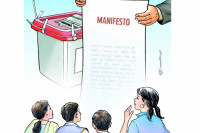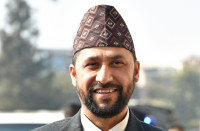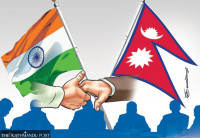National
Five left parties unite to condemn Israeli attacks on Iran and Palestine
The communist parties decide to hold joint protests.
Post Report
Five major leftist parties in Nepal, including the CPN (Maoist Centre), have decided to organise a joint protest programme condemning Israel’s intervention in West Asia.
The communist parties criticise Israeli actions and call for solidarity with Palestine and Iran while some experts advocate closer ties with Israel due to Nepal’s strategic interests.
They also discussed internal challenges among Nepal’s communist parties regarding unity and collective action.
According to Dev Gurung, general secretary of the Maoist Centre, a meeting of the five parties held on Saturday at the Maoist Centre headquarters in Peris Danda decided to organise a demonstration to oppose Israeli interference in the region.
Gurung said the meeting also discussed forming a mechanism to launch a campaign against the brutal Israeli killings of Palestinians.
They have also decided to discuss the matter with other political parties as well.
Leaders present at the meeting included Maoist Centre chair Pushpa Kamal Dahal, CPN (Unified Socialist) chair Madhav Kumar Nepal, Nepal Communist Party spokesman Khadga Bahadur Bishwakarma, CPN (Masal) General Secretary Mohan Bikram Singh, and Acting General Secretary of the Revolutionary Maoist Party, CP Gajurel.
Some experts on international relations argue that when issues involving Israel, Iran, and Palestine arise in West Asia, Nepal should stand in support of Israel, as Nepal’s national interest is increasingly tied to its relationship with the country.
Citing that around 5,000 to 7,000 Nepalis are currently working in Israel, they say that Nepal should focus on strengthening its ties with Israel.
“Nepal was among the countries to recognise Israel at a time when it had not yet gained widespread international recognition,” said Arun Kumar Subedi, a foreign policy adviser to then-prime minister Sher Bahadur Deuba.
The first elected prime minister of Nepal, BP Koirala, established diplomatic relations with Israel on June 1, 1960, making Nepal the first South Asian country to establish diplomatic ties with Israel.
For this reason, if any day Nepal’s relationship with Western powers—particularly the United States—were to deteriorate at any point, Israel could serve as a diplomatic bridge to help mend those ties, he argues. “Hence, from the perspective of national interest, Israel remains an important strategic partner for Nepal,” Subedi added.
According to him, Nepal’s communist parties are often guided more by emotion than by national interests when making foreign policy decisions. Subedi criticises their tendency to prioritise ideological sentiment over pragmatic diplomacy.
A Nepali student, Bipin Joshi, who had gone to Israel for study, was taken hostage by Hamas in October 2023 and his whereabouts are still unknown. Subedi expresses surprise that Nepal’s communist parties continue to side with Palestine, which, he notes, is governed in Gaza by the same Hamas group that abducted Joshi.
Subedi believes that such a stance disregards Nepal’s direct interests and instead reflects a politically charged, emotionally guided position.
However, Acting General Secretary of the Revolutionary Maoist Party Gajurel stated that while it is indeed condemnable that Hamas took a Nepali citizen hostage and has failed to provide any information about him, it is not justified for an entire community to suffer the horrors of war because of the actions of one group.
Gajurel stated that although claims have been made regarding a ceasefire between Israel and Palestine, Israel has continued its attacks with the backing of the United States. The meeting, therefore, decided to condemn these ongoing assaults, he said.
“The type of attacks Israel has carried out on Palestine and Iran with the backing of the United States is deplorable. We have decided to launch a protest against it,” Gajurel told the Post.
Maoist Centre chair Dahal, who is also the main opposition leader in the House, raised the issue of unity among the communist parties. However, after hearing the views of other participants at the meeting, he stated that it is not the right time to emphasise immediate unity, Gajurel said.
“Currently, the situation is such that even forging a working alliance among the communist parties is not feasible immediately, let alone going for a full-fledged unification,” Gajurel said.




 11.12°C Kathmandu
11.12°C Kathmandu














